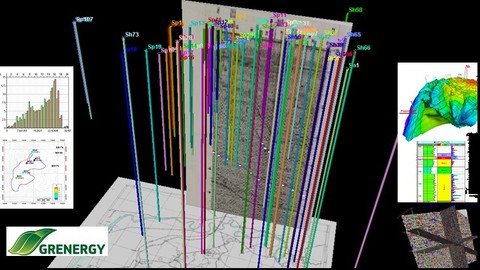Data Management In Oil And Gas Industry

Published 3/2023
MP4 | Video: h264, 1280x720 | Audio: AAC, 44.1 KHz
Language: English | Size: 5.23 GB | Duration: 10h 13m
Implementation of modern data technologies in highly data intensive oil and gas industry
What you'll learn
Meta data, data, vintage, geospatial data, operations for data collection/ acquisition
Differentiate between data, information and knowledge, data interpretation and processing, indexing, data life cycle
The lifecycle of surface and subsurface exploration, production data and related information management issues,
GIS and Modern Information Technologies (IOT, AI, Block chain, Machine and Deep learning)
Firm grip on various subsurface data to undergo repository processes in the database.
Thorough, effective and practical flow in handling and managing petroleum data.
Cartography Reference System for loading data at cross over regions of different Datum.
Loading the database i.e. all categories in the well data set in one single database from drilling to production and abandonment.
Requirements
To have basic information about Data Management, Data Techniques, IT & Geo-science
Description
In this course, the content is going to leverage participants understanding the total data flow principles of surface and subsurface data management by going through golden rules in detail, various data categories in geology, seismic, navigation, E&P database design, knowing G&G software . All the important points covered are also illustrated by figures and tables with examples given.In all disciplines of oil and gas industry, acquired data is growing exponentially day by day. Currently, storage capacities are in the size of petabytes which is equivalent to ~1000TB (One thousand Terabytes). Thus, the need to perform data governance is cumbersome but inevitable. A strong and consistent data governance ensures operational success, long-term cost and time savings. This course reveals the value that data generates within E&P companies. It then reviews the most important themes that the areas where improvements are commonly can be found. All E&P companies are generating value with their existing data management, the important question is whether there are compelling business cases to expand on their current capabilities.This course is focused on the information generated through data analytics related to the subsurface. This data ranges from exploration data, such as seismic surveys to production data, such as hourly flow readings, and from objective measurements, such as raw log readings to interpreted results such as dynamic reservoir models. The key reason that oil companies spends millions on data is in order to reduce the “development uncertainties”.The final conclusion is that all oil company personnel should carefully review their current data management tasks and responsibilities. In most companies there are opportunities to expand the governance, access, security or quality of data which would significantly increase the total value an organizational profitablity.Throughout the course, you will find communication medium informal, interactive and the topics are covered by implementation of practical case studies/hands on exercises. Every time in video recordings I ask questions, try to write your own reply on a pieces of paper and check yourself. InstructorMr. Serdar Kaya is a senior consultant with an extensive experience in geoscience, data analytics, reservoir characterization, geological modeling and various high tech applications. He has published several journal and conference papers about innovative data modeling approaches for challenging issues. He has also successfully trained, mentored and coached many geoscientists, geologist and engineers. He holds both MSc and BSc degrees in Petroleum Engineering. His achievements and high level of technical competence are a reflection not only his engineering knowledge but also high level of personnel commitment and drive.
Overview
Section 1: Introduction Oil and Gas Industry Data
Lecture 1 Introduction to Data Management in Oil and Gas Industry
Lecture 2 Introduction to information management
Lecture 3 Oil and Gas Data types and formats
Lecture 4 O&G Data Management issues
Lecture 5 Geo-referenced Spatial Data
Lecture 6 Data Governance, Strategy, Management, Analytics.. etc
Section 2: Data Management Methodologies
Lecture 7 Data Management Best Practices
Lecture 8 Oil and Gas Data Management
Lecture 9 Database and Backup systems
Lecture 10 Data life-cycle
Section 3: Data Management Methods
Lecture 11 The value of data & data management
Lecture 12 Benefits of Good Data Management
Lecture 13 Business case aspects and barriers
Lecture 14 Database Architecture
Lecture 15 Master Data Management
Lecture 16 Data Quality Management
Lecture 17 DM Development Tools
Section 4: Geoscience Data Management
Lecture 18 Seismic Data
Lecture 19 G&G Data
Lecture 20 Well Data
Lecture 21 G&G and Engineering Data Quality
Section 5: Oil and Gas Project Data management
Lecture 22 Project Database Construction
Lecture 23 Modeling and Simulation
Lecture 24 Data Integration
Section 6: Integration Management Services
Lecture 25 Data Integrated Field Development
Lecture 26 Integrated Team Approach
Data Managers, Data Technicians, IT personnel,Geomodeller, Geologists, Geophysicist,,Reservoir Engineers,Geo-scientists,Oil and gas investors
Screenshots
Homepage
without You and Your Support We Can’t Continue
Thanks for Buying Premium From My Links for Support
Click >>here & Visit My Blog Daily for More Udemy Tutorial. If You Need Update or Links Dead Don't Wait Just Pm Me or Leave Comment at This Post
Download from free file storage
Resolve the captcha to access the links!
Registered members don't get captcha ... just sayin
